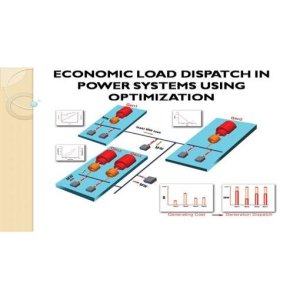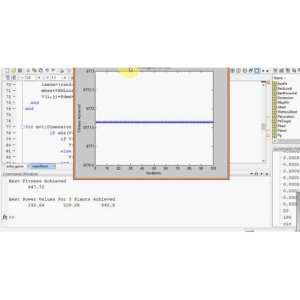Optimizing Hybrid Power Generation System with Fuzzy Logic and Chaotic Map-Differential Evolution
Problem Definition
The renewable energy industry faces a critical challenge in optimizing power generation and extraction from solar panels and wind energy sources to ensure a consistent and efficient power supply. Traditional systems experience significant power losses when solar panels are unable to generate electricity due to lack of sunlight, highlighting the need for more efficient energy harnessing methods. The limitations and problems within this domain revolve around the intermittent nature of renewable energy sources, leading to inconsistent power supply and reduced overall energy output. By addressing these pain points and implementing innovative solutions, such as advanced algorithms and technologies in MATLAB, this project aims to overcome these challenges and pave the way for a more sustainable energy future.
Objective
The objective of this project is to optimize energy generation and extraction from renewable resources such as solar panels and wind energy sources. By developing an MPPT model for solar panels and incorporating wind energy into the system, the goal is to maintain a consistent and efficient power supply even during periods of low sunlight. The project utilizes Fuzzy Logic, a de-optimization algorithm, and a chaotic map in MATLAB to enhance the system's performance and efficiency. The aim is to maximize power extraction from solar panels and facilitate a smooth transition to wind energy, ultimately contributing to a more sustainable energy future.
Proposed Work
The proposed project aims to address the challenge of optimizing energy generation and extraction from renewable resources such as solar panels and wind energy sources. By focusing on designing an MPPT model for solar panels and integrating wind energy into the system, the goal is to ensure a consistent and efficient power supply even when sunlight is unavailable. The team utilized Fuzzy Logic to define membership function ranges and implemented a de-optimization algorithm along with a chaotic map to enhance the system's performance. Through the use of MATLAB, the models were designed, tested, and compared with existing systems to evaluate the efficiency of the proposed approach.
By combining different technologies and algorithms, the project seeks to achieve maximum power extraction from solar panels and enable a smooth transition to wind energy when needed.
The rationale behind the chosen techniques lies in their ability to optimize power generation and reduce losses effectively. By using Fuzzy Logic for membership function ranges, the system can adapt to varying environmental conditions, while the de-optimization algorithm ensures efficient power extraction. Additionally, the inclusion of a chaotic map aims to further enhance the system's performance and overall efficiency. Overall, the project's approach is centered around maximizing energy output from renewable sources through a sophisticated and adaptive system design.
Application Area for Industry
The proposed solutions in this project can be used in various industrial sectors such as renewable energy, power generation, energy storage, and smart grid management. Industries that heavily rely on solar panels and wind energy for power generation can benefit from the optimization of energy extraction to ensure consistent and efficient power supply. The integration of a MPPT system for solar panels, along with wind energy utilization, can help industries overcome the challenge of power losses during periods of insufficient sunlight. By using Fuzzy Logic to determine membership function ranges and a de-optimization algorithm to enhance energy generation, industries can maximize their renewable energy sources' potential and reduce their dependence on traditional power sources. Additionally, incorporating chaotic maps into the system can further improve the efficiency and reliability of power generation from solar panels and wind energy sources.
Overall, implementing these solutions can lead to increased sustainability, reduced operational costs, and improved energy management in various industrial sectors.
Application Area for Academics
The proposed project can significantly enrich academic research, education, and training within the field of renewable energy and power systems. By developing an MPPT system for solar panels that optimizes power extraction and incorporates wind energy as a backup source, this project addresses a crucial challenge in the renewable energy sector.
The utilization of Fuzzy Logic, de-optimization algorithms, and chaotic maps highlights innovative research methods and simulations that can be applied to optimize energy generation and extraction. Through the use of MATLAB and algorithms such as ACU+, researchers, MTech students, and PhD scholars can benefit from the code and literature of this project to enhance their own research in renewable energy systems.
This project's relevance lies in its potential applicability in real-world scenarios, where consistent and efficient power supply from renewable sources is essential.
Researchers and students can further explore the integration of different technologies and algorithms to enhance the performance of renewable energy systems.
The future scope of this project includes expanding the research to other renewable energy sources and implementing more advanced optimization techniques to improve energy generation efficiency. Additionally, the integration of machine learning algorithms and big data analytics could further enhance the capabilities of the MPPT system.
Algorithms Used
The project primarily leveraged two main algorithms. First, a de-optimization algorithm was used to solve the problem of determining the range of membership function for the fuzzy logic system. This algorithm helped in optimizing the performance of the fuzzy logic system by fine-tuning the membership function ranges.
Secondly, an Optimization along with Artificial Intelligence algorithm (ACU+) was used to reduce fluctuations and increase the power extraction capability of the MPPT system. This algorithm helped in optimizing the MPPT system to ensure maximum power extraction from the solar panels.
Overall, these algorithms played a crucial role in enhancing the accuracy and efficiency of the MPPT system for solar panels, allowing for improved power extraction and performance, especially during periods of low sunlight. The MATLAB software was utilized for designing, testing, and comparing the results of the models, leading to a more effective and robust system.
Keywords
solar power, wind energy, renewable resources, MPPT, MATLAB, fuzzy logic, de-optimization algorithm, chaotic map, artificial intelligence, energy optimization, power output, fluctuation reduction, hybrid system, energy generation, membership function
SEO Tags
solar power, wind energy, renewable resources, MPPT, Maximum Power Point Tracking, MATLAB, fuzzy logic, de-optimization algorithm, chaotic map, artificial intelligence, energy optimization, power output, fluctuation reduction, hybrid system, energy generation, membership function, research scholar, PhD, MTech, solar panel optimization, wind energy extraction, power generation efficiency, renewable energy sources, MATLAB simulation, fuzzy logic implementation, chaotic map integration, energy generation models, power supply optimization, artificial intelligence in energy systems
| Shipping Cost |
|
No reviews found!





















































No comments found for this product. Be the first to comment!